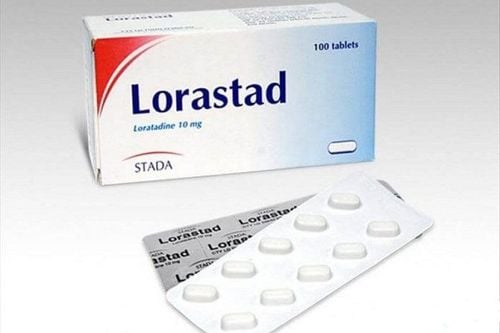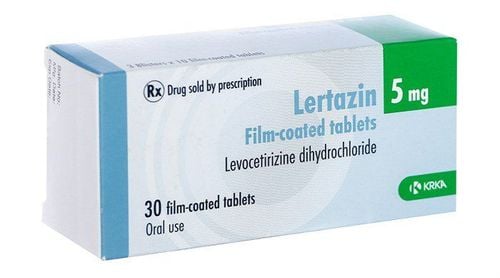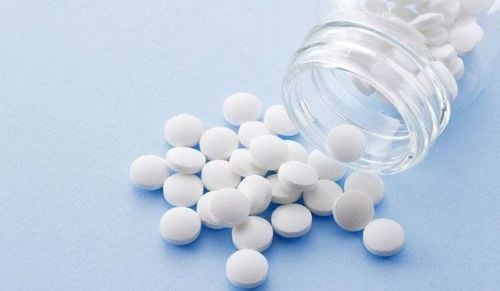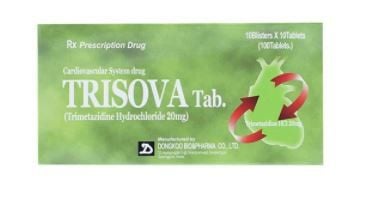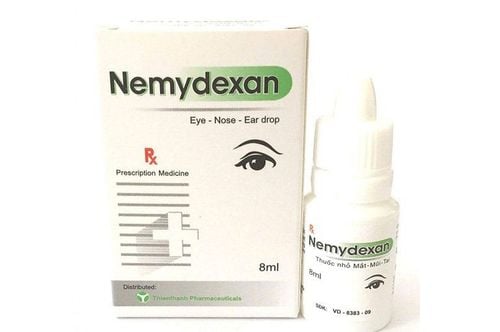This is an automatically translated article.
Atilene is an anti-allergic drug used in the treatment of respiratory allergies, conjunctivitis and skin diseases such as itching, urticaria,... So what is Atilene?
1. The effect of the drug Atilene
What is Atilene? Atilene belongs to the group of anti-allergic drugs and is used in cases of hypersensitivity. Atilene is indicated in the treatment of the following conditions:
Respiratory allergies: runny nose, sneezing, rhinitis Conjunctivitis and skin inflammation such as itching, urticaria Frequent vomiting in children Insomnia in children and adults major Relieves dry and irritating coughs, especially in the case of a profuse cough at night and in the afternoon Acute delirium In addition, some other drug effects not listed on the approved drug label, but In some cases, the doctor may prescribe the use of Atilene. Therefore, before taking the medicine, consult your doctor.
2. How to use Atilene
Atilene is made in the form of an oral solution. Dosage will be based on the condition and age of the patient.
Treatment of urticaria, rash:
For adults, take 25mg daily, 2-3 times a day. For more severe cases, take 100mg/day. For the elderly, take 2 tablets of 5mg 1-2 times a day. For children over 2 years old, take 2.5-5mg, 3-4 times a day. Antihistamines and antitussives:
For adults, take a dose of 5mg, 1-2 times a day. For children over 2 years old, take 0.5mg-1mg/kg/day, divided into several times. Effects on sleep, take only once before going to bed
For adults take a dose of 5-20mg For children over 2 years old take a dose of 0.25-0.5 mg/kg/day Treat delirium Acute alcohol: for adults, the dose is 50-200mg/day.
To use the medicine safely, take Atilene exactly as directed by your doctor, do not use it more often, smaller or longer than prescribed. Use Atilene regularly to get the most benefit from it and you can stop taking it if any new symptoms appear or the condition does not improve after 7 days. Patients absolutely do not abuse the drug for too long for a long time. This does not make the patient's condition better, but also increases the risk of unwanted effects.
3. Undesirable effects when using Atilene
Atilene can cause some unwanted and common side effects that can be mentioned as:
Fatigue Fatigue Headache Mild dizziness Dry mouth Thick phlegm Drowsiness Constipation Eye regulation disorder Before prescribing medicine, doctors always consider the benefits and effectiveness of the drug Atilene. When using Atilene can still occur unwanted effects. Therefore, when there are unusual symptoms, especially when a severe allergic reaction occurs with accompanying signs such as severe dizziness, difficulty breathing, rash, ... the patient needs to be informed. Immediately notify the doctor or nurse for immediate medical intervention.
4. Some notes when using Atilene
Some notes when using Atilene include:
Allergic history notice Atilene hypersensitivity reaction to any other allergy. Atilene may contain inactive ingredients and could cause an allergic reaction or other serious problems. Report any medications you are taking including prescription and nonprescription drugs, herbs and supplements, foods, dyes or preservatives. Atilene is contraindicated in patients with liver and kidney dysfunction, hypothyroidism, parkinsonism, pheochromocytoma, myasthenia gravis, patients with overdose due to opiates, barbiturics, alcohol, patients at risk of urinary retention. associated with prostatic urethral disorders, people with a history of phenothiazine derivatives-associated granulocytosis, people at risk for angle-closure glaucoma, children under 6 years of age, and women during pregnancy and lactation. Breastfeeding. Use caution when using Atilene for the elderly, especially when too cold or too hot causes orthostatic hypotension, drowsiness, dizziness, constipation, cardiovascular disease. Atilene may interfere with skin tests for allergens, avoid alcohol or other CNS depressants. If you forget to take a dose of Atilene, take it as soon as possible. However, if it is close to the time of your next dose, skip the missed dose and continue taking or injecting the medicine as scheduled. Do not use more drug than prescribed treatment. Overdosing on Atilene or swallowing it can cause serious symptoms such as nausea, vomiting, abdominal pain, shortness of breath, fainting,...
5. Drug interactions
Drug interactions can reduce the effect of Atilene, or increase the effect of unwanted effects. Tell your doctor about all other medicines you are taking including over-the-counter medicines, vitamins, prescription drugs, and herbal products. Do not start, stop or change the dose of any medicine without your doctor's consent.
Some drugs that can interact with Atilene include:
Alcohol, sedatives, barbituric hypnotics, strong CNS depressant effects, respiratory depression also occur and increase the effect of antihypertensive drugs. . Anticholinergic effect of Atilene is increased when combined with other anticholinergic drugs leading to seasickness and constipation. Atilene antagonizes the therapeutic effects of levodopa, guanethidine, clonidine, adrenaline Some drugs block the absorption of Atilene Atilene as antacid, lithium, parkinsonian.
6. How to store Atilene
Store Atilene with film-coated tablets at room temperature below 30 degrees Celsius, protected from light and away from moisture. Do not store Atilene in a humid place or in the freezer and keep away from heat and open flames. Different medicines will have different ways to store them, so read the Atilene storage instructions carefully on the packaging, or ask your pharmacist. Keep Atilene out of the reach of children and family pets. When the medicine has expired or is damaged and cannot be used anymore, dispose of it and dispose of it properly. Do not arbitrarily dispose of Atilene into the environment such as plumbing or toilet unless requested. Consult with your waste disposal company or pharmacist on how to safely dispose of Atilene to help protect the environment.
In summary, Atilene is an anti-allergic drug and used in cases of hypersensitivity, effective in the treatment of respiratory allergies, conjunctivitis and skin diseases such as itching, urticaria,... However, Atilene has May cause some unwanted effects and drug interactions, so tell your doctor what medicines you are taking to reduce the risk of unwanted effects and at the same time increase the effectiveness of the process. treatment.
Follow Vinmec International General Hospital website to get more health, nutrition and beauty information to protect the health of yourself and your loved ones in your family.
Please dial HOTLINE for more information or register for an appointment HERE. Download MyVinmec app to make appointments faster and to manage your bookings easily.




